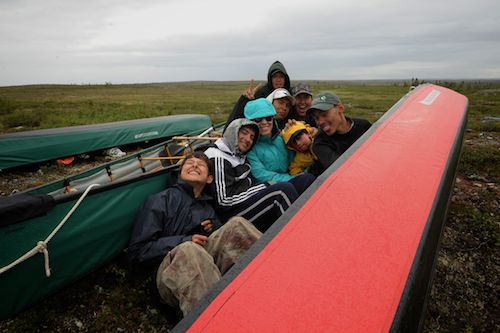
The Nature Conservancy's lead scientist Sanjayan and Canada program director Dr. Richard Jeo are on an expedition through one of Canada's most pristine areas with young members of the Dene First Nation. They're canoeing along the Thelon River, ending in North America's largest and most remote wildlife refuge, the Thelon Game Sanctuary.

Photo credit: Ami Vitale
The end is in sight.
We have reached Hornby Point, where the hungry bones of three men rest beneath wooden crosses staked in a copse of black spruce. John Hornby and his companions had counted on caribou that had not come, and had paid for the vastness of the land with their lives.
We have been on the river for over two weeks, accompanying a group of youth and two hunters and guides (Joseph Catholique and James Lockhart) from the Dene First Nation into the their ancestral hunting ground and spiritual abode. We have endeavored to expose Dene youth to the heartbeat of their land and to the culture of their people. We supported this expedition because we believe that this next generation of young leaders will be the ones who will need to speak for the Thelon the loudest.
"The-lew-dezeth" (Fish River) is for the Dene "the place where God began." We call it the Thelon Game Sanctuary. It is the biggest place I have been in. At 52,000 sq km it is so vast and uniform across the cardinal points, that no matter where you are, you always feel like you are in the middle of it. It is at once both full and empty of life. It can kill you from starvation and yet deliver caribou and arctic grayling, literally to camp. Though it is a federally recognized Game Sanctuary, the only such designated landscape in Canada, it has little management, littler funding, trammelled borders, looming threats, and no place for the people who want, and wait, to be its most ardent protectors -- the Dene of Lutsel K'e.
The aboriginal kids with us, by any measure, had it rough -- and I don't mean on this expedition. For some their biggest dream is to work in a mine. Others keep dreams to themselves. They are trapped; between ancestral stories and reality TV, between the co-op porch and addictive mischief, between today and no tomorrow. This is not a summer camp canoe trip in up-state New York. Let me put it this way. Though I lost weight on our journey, for some kids, our diet was an upgrade.
These seven kids have built us fires, found food, entertained and propelled us down the river through the lands of their ancestors. For two weeks they were like gods on the Thelon.
And now they go home.
In the morning two float planes will carry us off; some to the United States, while the Dene will go to their village of Lutsel K'e or Yellowknife, the biggest city in the North West Territories. We will all return to our lives. My hope is that the memories and promises made on the Thelon will fade a lot slower than the scars of biting flies that tattoo us.
The prospects are ominous. Yellowknife, "the Diamond Capital of the World" (they trademarked the slogan), promises wealth and jobs, though when I went through I didn't see much sparkle.
As a kid I had grown up in another "Diamond Capital." In West Africa, Sierra Leone proclaims itself "the Land of Iron and Diamonds" -- said so right on the postage stamps; stamps that most locals could barely afford. What I see on the streets of Yellowknife are a lot of hungry, dejected and desperate faces. I see the "Caribou People" lined up outside KFC.
I am more convinced than ever that in faraway places, for conservation to work, to have a chance at sustainability, the people closest to the land must have a voice. It may not sound like mine (or yours) but without their voice all we can hope for is a park, while with it we have a place.
A lot of people claim to speak for the Thelon: The Federal government in Ottawa, the Territorial Government in Yellowknife, mining companies, conservation organizations, Canadians and foreigners. These voices are rightly legitimate. But for me, the clarion call for "The-lew-dezeth," must come loudest from the Dene themselves; those who were here first and whose ancestors will linger till the last.
Everything on the Thelon is a trade. What it takes it also gives. Without the voice of the Dene, the Thelon may not survive the assault that will surely come. But equally, I think, the Dene will not survive as the "Caribou People" should their voice leave the barrens. While the Thelon needs the Dene for its protection, perhaps the Dene need the voice that the Thelon gives them even more.
Halfway through our expedition we had stumbled upon a mining claim on the banks of the Upper Thelon River.
"Government people from Ottawa come and use big words to tell us about this land," Joseph Catholique told us while we surveyed the wooden claims stakes scattered at our feet.
"Some of these words I do not understand," he said. "My words are simple: I love this place."
Follow the journey on Twitter and Cool Green Science.